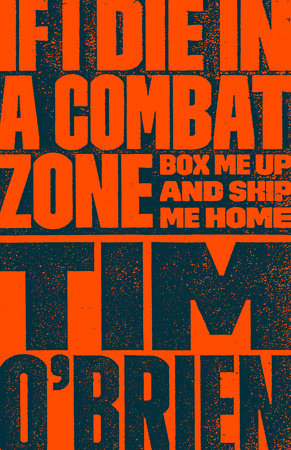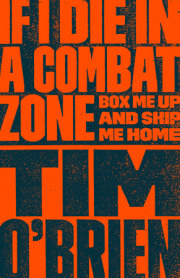Days"It's incredible, it really is, isn't it? Ever think you'd be humping along some crazy-ass trail like this, jumping up and down like a goddamn bullfrog, dodging bullets all day? Back in Cleveland, man, I'd still be asleep." Barney smiled. "You ever see anything like this? Ever?"
"Yesterday," I said.
"Yesterday? Shit, yesterday wasn't nothing like this."
"Snipers yesterday, snipers today. What's the difference?"
"Guess so." Barney shrugged. "Holes in your ass either way, right? But, I swear, yesterday wasn't nothing like this."
"Snipers yesterday, snipers today," I said again.
Barney laughed. "I tell you one thing," he said. "You think this is bad, just wait till tonight. My God, tonight'll be lovely. I'm digging me a foxhole like a basement."
We lay next to each other until the volley of fire stopped. We didn't bother to raise our rifles. We didn't know which way to shoot, and it was all over anyway.
Barney picked up his helmet and took out a pencil and put a mark on it. "See," he said, grinning and showing me ten marks, "that's ten times today. Count them-one, two, three, four, five, six, seven, eight, nine, ten! Ever been shot at ten times in one day?"
"Yesterday," I said. "And the day before that, and the day before that."
"No way. It's been lots worse today."
"Did you count yesterday?"
"No. Didn't think of it until today. That proves today's worse."
"Well, you should've counted yesterday."
We lay quietly for a time, waiting for the shooting to end, then Barney peeked up. "Off your ass, pal. Company's moving out." He put his pencil away and jumped up like a little kid on a pogo stick. Barney had heart.
I followed him up the trail, taking care to stay a few meters behind him. Barney was not one to worry about land mines. Or snipers. Or dying. He just didn't worry.
"You know," I said, "you really amaze me, kid. No kidding. This crap doesn't get you down, does it?"
"Can't let it," Barney said. "Know what I mean? That's how a man gets himself lethalized."
"Yeah, but--"
"You just can't let it get you down."
It was a hard march and soon enough we stopped the chatter. The day was hot. The days were always hot, even the cool days, and we concentrated on the heat and the fatigue and the simple motions of the march. It went that way for hours. One leg, the next leg. Legs counted the days.
"What time is it?"
"Don't know." Barney didn't look back at me. "Four o'clock maybe."
"Good."
"Tuckered? I'll hump some of that stuff for you, just give the word."
"No, it's okay. We should stop soon. I'll help you dig that basement."
"Cool."
"Basements, I like the sound. Cold, deep. Basements."
A shrill sound. A woman's shriek, a sizzle, a zipping-up sound. It was there, then it was gone, then it was there again.
"Jesus Christ almighty," Barney shouted. He was already flat on his belly. "You okay?"
"I guess. You?"
"No pain. They were aiming at us that time, I swear. You and me."
"Charlie knows who's after him," I said. "You and me."
Barney giggled. "Sure, we'd give 'em hell, wouldn't we? Strangle the little bastards."
We got up, brushed ourselves off, and continued along the line of march.
The trail linked a cluster of hamlets together, little villages to the north and west of the Batangan Peninsula. Dirty, tangled country. Empty villes. No people, no dogs or chickens. It was a fairly wide and flat trail, but it made dangerous slow curves and was flanked by deep hedges and brush. Two squads moved through the tangles on either side of us, protecting the flanks from close-in ambushes, and the company's progress was slow.
"Captain says we're gonna search one more ville today," Barney said. "Maybe--"
"What's he expect to find?"
Barney shrugged. He walked steadily and did not look back. "Well, what does he expect to find? Charlie?"
"Who knows?"
"Get off it, man. Charlie finds us. All day long he's been shooting us up. How's that going to change?"
"Search me," Barney said. "Maybe we'll surprise him."
"Who?"
"Charlie. Maybe we'll surprise him this time."
"You kidding me, Barney?"
The kid giggled. "Can't never tell. I'm tired, so maybe ol' Charles is tired too. That's when we spring our little surprise."
"Tired," I muttered. "Wear the yellow bastards down, right?"
But Barney wasn't listening.
Soon the company stopped moving. Captain Johansen walked up to the front of the column, conferred with a lieutenant, then moved back. He asked for the radio handset, and I listened while he called battalion headquarters and told them we'd found the village and were about to cordon and search it. Then the platoons separated into their own little columns and began circling the hamlet that lay hidden behind thick brush. This was the bad time: The wait.
"What's the name of this goddamn place?" Barney said. He threw down his helmet and sat on it. "Funny, isn't it? Somebody's gonna ask me someday where the hell I was over here, where the bad action was, and, shit, what will I say?"
"Tell them St. Vith."
"What?"
"St. Vith," I said. "That's the name of this ville. It's right here on the map. Want to look?"
He grinned. "What's the difference? You say St. Vith, I guess that's it. I'll never remember. How long's it gonna take me to forget your fuckin' name?"
Copyright © 1999 by Tim O'Brien. All rights reserved. No part of this excerpt may be reproduced or reprinted without permission in writing from the publisher.









